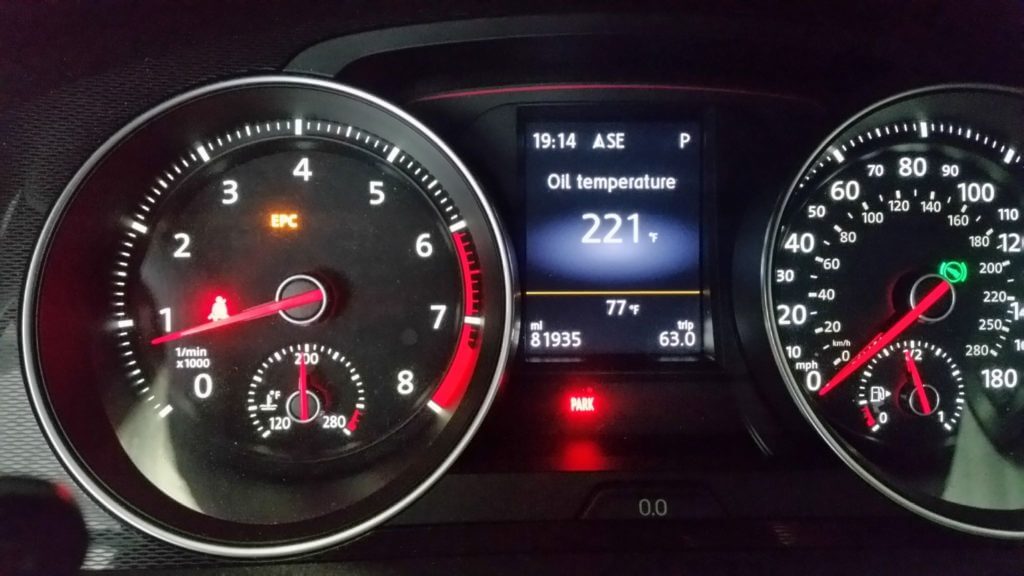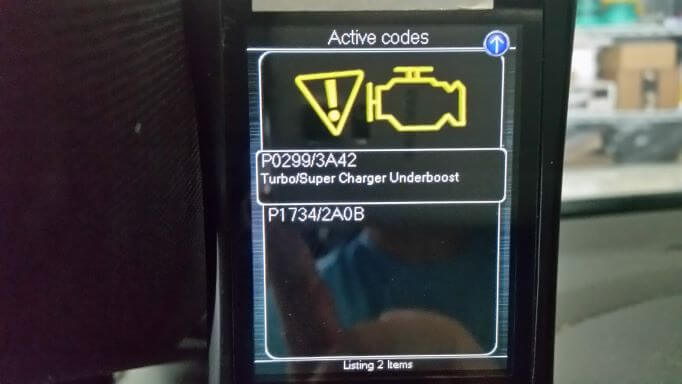Background:
I’ve come across questions of this type from time to time;
I’m swapping an IS38 on my GTI and won’t be able to get it tuned until some future date, will I be safe to drive it with an IS20 tune?
Mk7 GTI Enthusiast
Not surprisingly, the answers to the GTI enthusiast range from “go ahead, just don’t drive crazy” to “it’s not safe, (you’ll shoot your eye out kid!), you ought to have the car towed to the shop to get tuned“.

My experience with monkeying with older pneumatic wastegates in ways that the ECU is unaware of was that it’s not ideal, but nothing terrible resulted. But, the GTI has an electronic wastegate and what it may do “might” be different or unexpected.
Experiment:
To find out how the ECU responds to operating with an IS38 turbo and an IS20 tune I decided to try it.
What tune to use? I have the Eurodyne software and could install their Stage 2 file, but it takes nearly 50 minutes to flash the ECU. I’d rather not spend that long waiting to record some data. Pass.
I could download the Cobb OTS files from their website.
You’re playin’ with fire man, the Cobb OTS tune can kill an engine all by itself!
Internet wisdom
The Cobb Stage 2 93 octane tune is the best match to my hardware, save for the IS38+ turbocharger and HPA HPFP that my GTI presently has installed.
Cobb IS20 OTS file + IS38 turbo ?

Despite some internet wisdom against trying this concoction, I proceeded forward downloading the current Cobb Stage 2 file. This is also the new “green” file, so throwing a DTC for having an aftermarket downpipe is also a possibility.

Flashing now…
To see what happens I will drive around gradually applying more accelerator input while logging the ECU with the Accessport.

Results:
BLUF: Neither the engine nor turbo blew up.
Overview of the first half of the drive:

Towards the end of the first half I started getting on the accelerator progressively deeper, this next chart is a close-up of that portion of the drive.

At this point, an EPC was triggered.

I was unsure if the cause was the Tune / Turbo mismatch, or the Cobb “green” tune unhappy about the downpipe.
Not knowing I decided to push the accelerator harder and see if the ECU would limit the boost.
As the overview of the return trip shows below, I was still able to obtain boost pressure from the turbo.

Note: I don’t know what the expected boost profile of the Cobb Stage 2 tune is.
The next chart is a close-up of the area of interest in the overview.

This is a close-up of the final hard acceleration:

Adding engine rpm from this last pull:

Returning home, the Cobb reported:

Conclusions:
No surprise that when pushed hard enough the mismatch of tune and turbocharger led to the ECU triggering the EPC alert.
Boost control was clunky. Was the source the software/hardware mismatch or the Cobb tune just not being refined or was it both? I don’t know.
This IS38 turbo & EQT custom tune setup regularly hits 28 psi and holds that to 5000 rpm before tapering down to around 22-23 psi by redline.
With the Cobb Stage 2 93 octane tune it peaked around 18 psi with 70-75% accelerator pedal input. This amount of pedal input was enough to cause some wheel slip, although the street was not bone dry.
Still, while not being wide-open throttle (WOT) this was more aggressive acceleration than I would request from the engine with a software and turbo mismatch if I wasn’t experimenting to see what would happen.
The fact that the IS38 made less boost than what it does with a proper tune was a good sign.
Nothing concerning resulted and it seems likely that had I stayed out of boost the EPC would not have been triggered.

Were there instances of throttle closure to intervene against overboost?
Looks like at least one time:



But later it did not occur:
Second example:
It would appear to me that the Cobb IS20 OTS tune is clearly the best tune then. I think you can close the book on that outstanding item at least.
Did you log the AFR at all? I remember on older WRX’s that was pretty critical. Or is that handled by the ECU and controlled using other methods with the GTI?
I did log AFR but I haven’t done a comparison. The O2 sensor is a wideband so there is always closed-loop control of the AFR by the ECU. I’ll see if I can make a comparison in the next day or two.
Nothing unusual stands out:
